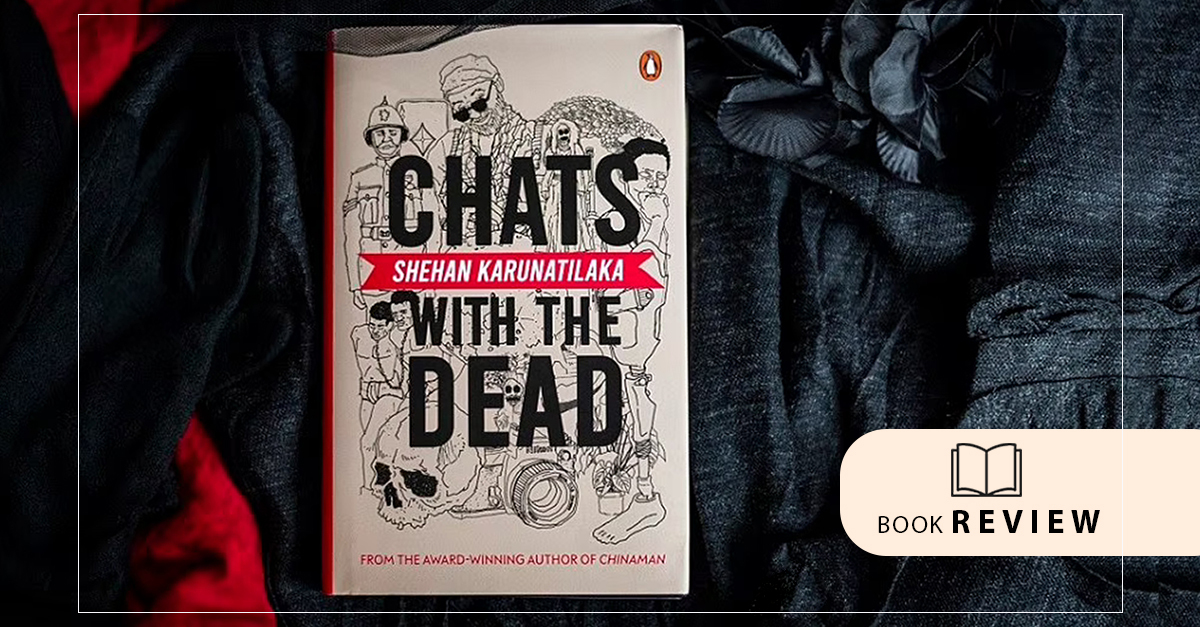
I spent close to two years reading and re-reading Shehan Karunatilaka’s Chinaman for the purposes of my thesis, and so it took me a while to muster the strength to tackle his latest novel Chats With The Dead. It was not because I had a particular quarrel with the author or his debut novel. It was simply a case of too-bloody-much. Upon recovering from the sheer trauma of my academic venture, however, and months and months after his latest release, I decided to brave it and found myself glad for several reasons; the first being that I had the pleasure of witnessing the evolution of a writer in my own lifetime, and the second, for reasons I did not expect: a strange catharsis. But more on that later.
While I will not say that this is the most stupendous literary feat in the history of literature or pass other such hyperbolic statements, I will say that it is far better and more mature than its predecessor and as far as Sri Lankan Anglophone literature is concerned, it is as good as it gets.
“Where Chinaman was a tad verbose, indulgent and even saggy, Chats With The Dead is sharp and snappy. It gets to the point without too many digressions, is well-paced and structurally concise, and, most importantly, showcases Karunatilaka’s evolution as a writer who is not merely satirical but also sensitive.”
The book also, in my humble opinion, responds well to the pressures of an orientalist literary market.
To tick the boxes (Karunatilaka style):
Would I recommend this book to someone? Yes.
Would I recommend its predecessor? Yes.
Would I recommend this book as a fine example of Sri Lankan Anglophone literature? Yes.
Would I put Karunatilaka at the forefront of the Sri Lankan Anglophone pantheon? Yes.
Is it about Sri Lanka? Yes (and perhaps even too much so).
Is the world building any good? Yes, yes, and yes.
Let us stay clear of spoilers and start with the world building. Chats With The Dead shares much with Chinaman, so if you have read the latter, you will find yourself immersed in a similar world with similar rules — nothing, for instance, is as straightforward as it seems, not the truth, nor even lies.
Sri Lanka, as Karunatilaka presents it, is a shadow-world that operates on its own quixotic set of rules. There is the usual gripe that we have heard every uncle under the sun utter, and which is often passed as universal wisdom: that all politicians are corrupt, all cops are bastards, everything politics touches is soiled etc. And then there is a set of familiar characters: I. E. Kugarajah makes a (prominent) reappearance, as does Jonny Gilhooley. Even Ari and Wije pop in a few times (although they are merely referenced, but never explicitly named). It is a familiar world, except inversed. If there was any doubt that Mother Lanka was home to a noxious underworld — in this case a truly local Tartarus — there is none now. Karunatilaka takes the familiar and frustrating world of the living and dexterously charts it onto the world of the dead: the underworld is as hierarchical and demonic as the above-world, and worst of all, it is also so damn bureaucratic. But even the bureaucracy is ambiguous, giving you the sense of a world with no rules. There is no escape from meaningless structure (meant to give life meaning and structure), and death is as senseless and as violent as life. The only way to navigate the Thanatos of Sri Lanka is with a heady dose of black humour.
“It is a familiar Karunatilaka-verse, except expanded, and this is where I feel the book ought to be commended.”
The mythology is familiarly Sri Lankan but it does not feel contrived, touristy or orientalist: rather, Karunatilaka thoroughly workshops this world to the point where it feels lived in, even real. I have no trouble believing that Mahakalis or pretas exist. In fact, I do not think I would mind so long as the yakas do not come with tourist-board-endorsed accents and ye olde frangipani cliches, which, thankfully, they do not.
The book, to elaborate, is decidedly hyperlocal, just as Chinaman is. Neither Chinaman nor Chats With The Dead set out to explain in excruciating and minute detail what Sri Lanka is; you will not find italics or definitions, there is no attempt to mark out “local” words and make them more palatable for a global audience, nor does the book attempt to tame and cage the strange beast that is Sri Lankan English.
Its hyperlocality works two ways; on one hand, there is a tendency to lean on stock Sri Lankanisms, which can get exceedingly annoying after a while. There are only so many references to Sri Lankanisms such as elephants and King Buvenekabahu III before the similes and analogies get tiresome and feel a tad overwrought. On the other hand, the book reads like a map that requires a certain intimacy with all things Sri Lankan to be fully appreciated and understood. Anyone standing outside may get lost in the hair-raising tuk tuk ride (and this is my attempt at a ‘Sri Lankan’ analogy) that the book is. There is little to no reductive attempt at explaining life in Mother Lanka, nor an attempt at boiling this life down into a concentrated syrup of orientalist clichés. There certainly are garrulous characters (with the exception of Jaki, who says it best with an eloquent ‘OK’), who pontificate endlessly, regurgitating uncle-isms and received, hacked wisdom. Yet, there is also a sense that Karunatilaka is poking fun at it, using the chaos of his universe to laugh at the absurdity of small talk, pained justifications, human speech and human lives in general. That said, while the world may appear hyperlocal, its tight structure and pacing lends the book considerable cohesion, preventing the reader from losing the narrative thread.
“If there is a tendency in Sri Lankan Anglophone literature to focus on the country’s collective trauma, such as riots, bombings, the war, the tsunami etc, there is a similar instinct here and yet, it is my contention that the book does not narrowly focus on a single subject but straddles multiple foci to weave a living picture of what it means to live (and die) in Sri Lanka.”
You could read it as an indictment of politics and the ugliness of war, or of Victorian sexual mores that the country has adopted with an unyielding zest (the protagonist, for instance, identifies as gay, and there is no such thing as being openly gay in Sri Lanka), or, as I prefer it, as an unexpected and heart-rending story of love in all its iterations and complexity. There is much you can say about sexuality, politics, and war but I would like to argue that neither are the crutch for at the core are personal relationships, which is where Karunatilaka’s strength and evolution as a writer show. There is no doubt that Chinaman has all these elements too, but Chinaman did not make me shed a tear. I did not find myself attached to Ari and Wije as I was to Jaki and DD, and I did not miss the former duo as much as I missed and even related to the latter. All this Karunatilaka manages without recourse to cloying sentiment or emotionally-charged language; the absence of emotion, in fact, is what makes you pause and look back at all the relationships you took for granted, at all the people you never got to say goodbye to and at how we are all fundamentally flawed. And while the book’s prose itself can be described as prosaic and has not seen much of an evolution, from this simple and yet poignant feat of writing, I felt something I have not felt a long time in my readings: catharsis. The book stayed with me, it made me think of all the Jakis and DDs of my life. Although the dead eventually let go, I found it hard to let go of Jaki and DD and the tinge of sadness that settles in at the end of the book. There is, of course, no real answer to life after death and other existential questions that the book poses (nor should one expect it of any book or person), but there is a painful reminder of mortality, human fallibility and human stupidity that lingers. And that, in my opinion, is the mark of a good book.
Gazala Anver is a former Editor-in-Chief of Roar Media, and has a Master of Arts (Research) from the University of Sydney.


